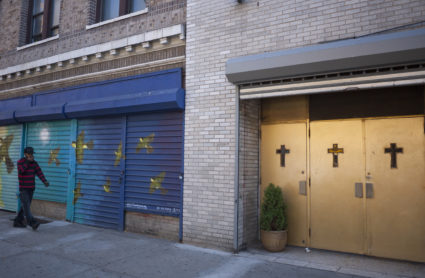Our November 2020 pick for Now Read This, the PBS NewsHour's book club with The New York Times, is Elizabeth Acevedo's "The Poet X." Become a member of the Now Read This book club by joining our Facebook group, or by signing up to our newsletter. Learn more about the book club here.
Below are questions to help guide your discussions as you read the book over the next month. You can also submit your own questions for Acevedo on our Google form. Acevedo will answer reader questions about "The Poet X" on the PBS NewsHour at the end of the month.
WARNING: Spoiler alert on questions further down
- What did you think of Acevedo's decision to write the novel in verse? What effect did this have on the telling of the story?
- "If Medusa was Dominican/ and had a daughter, I think I'd be her./ I look and feel like a myth./ A story distorted, waiting for others to stop/ and stare." What does this passage say about Xiomara's relationship with her changing body?
- At one point Xiomara's mother calls her an offensive word to describe a promiscuous woman. How does Xiomara repurpose the word rather than taking offense to it?
- "As I got older/ I began to really see/ the way that church/ treats a girl like me differently," Xiomara writes. When you were a teenager, what did you start to question about the things you had been taught?
- The Bible stories in Genesis, particularly that of Eve, are particularly questionable to Xiomara. Why do you think that is?
- At one point, Xiomara writes that her boyfriend Aman has "made a junkie" out of her: "He's turned me into a fiend:/ waiting for his next word/ hanging on his last breath/ always waiting for the next, next time." What did you think of her metaphor of addiction in this passage?
- "She knows me in ways I don't have to explain," Xiomara writes of her friend, Caridad. How does their friendship evolve throughout the novel?
- How do Xiomara and her twin support one another as they face pressure to fulfill certain expectations of gender and identity from their family?
- How did Acevedo's setting and language paint a picture of Xiomara's home and culture? What was most effective about her descriptions?
- Ms. Galiano encourages Xiomara to join her school's slam poetry club. Have you had a teacher who saw promise in you and inspired you to explore it?
- How does Xiomara change after performing slam poetry? Why does it open her up?
- How does Father Sean help Xiomara reconcile with her mother? Did you sympathize with her Mami despite the pain she caused?
- Was there one school assignment or essay written by Xiomara that stood out to you? If so, why?
- Would you share this book with younger readers in your life? Why or why not?
Support Canvas
Sustain our coverage of culture, arts and literature.

